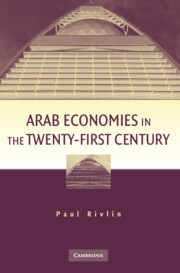7 - Jordan
From Rents to Markets?
Published online by Cambridge University Press: 05 June 2012
Summary
Jordan, more than any other Arab economy, is trying to wean itself off reliance on economic rents. The reorientation of the economy has brought about a dramatic increase in exports but, despite large investments in education and welfare, it suffers from high unemployment rates especially among the young and the better educated.
The economy moved from stagnation and crisis in the late 1980s to relatively fast growth that has exceeded that of the population in recent years. This was achieved by orthodox economic reforms, changes in Jordan's political stance, and the slowing of demographic growth. The period 1980–90 was marked by a decline in the share of rents in the economy. In recent years, the success of Jordan's economic reforms and its political realignment has also resulted in an increase in U.S. aid with positive implications for the state budget and the balance of payments. Jordan also benefited indirectly from the aftermath of the 2003 war in Iraq and the rise in oil revenues in the Gulf States although by 2005, there was evidence that these effects were receding.
Demography
Jordan has one of the fastest growing populations in the world, due to both natural growth and periods of net immigration. In 1950, the population was about 500,000; by 2000 it had recorded an almost tenfold increase. The total fertility rate (number of children per woman) declined from an annual average of 6.77 in 1980–5 to 3.53 in 2000–05, still a high figure by international standards.
- Type
- Chapter
- Information
- Arab Economies in the Twenty-First Century , pp. 155 - 173Publisher: Cambridge University PressPrint publication year: 2009



